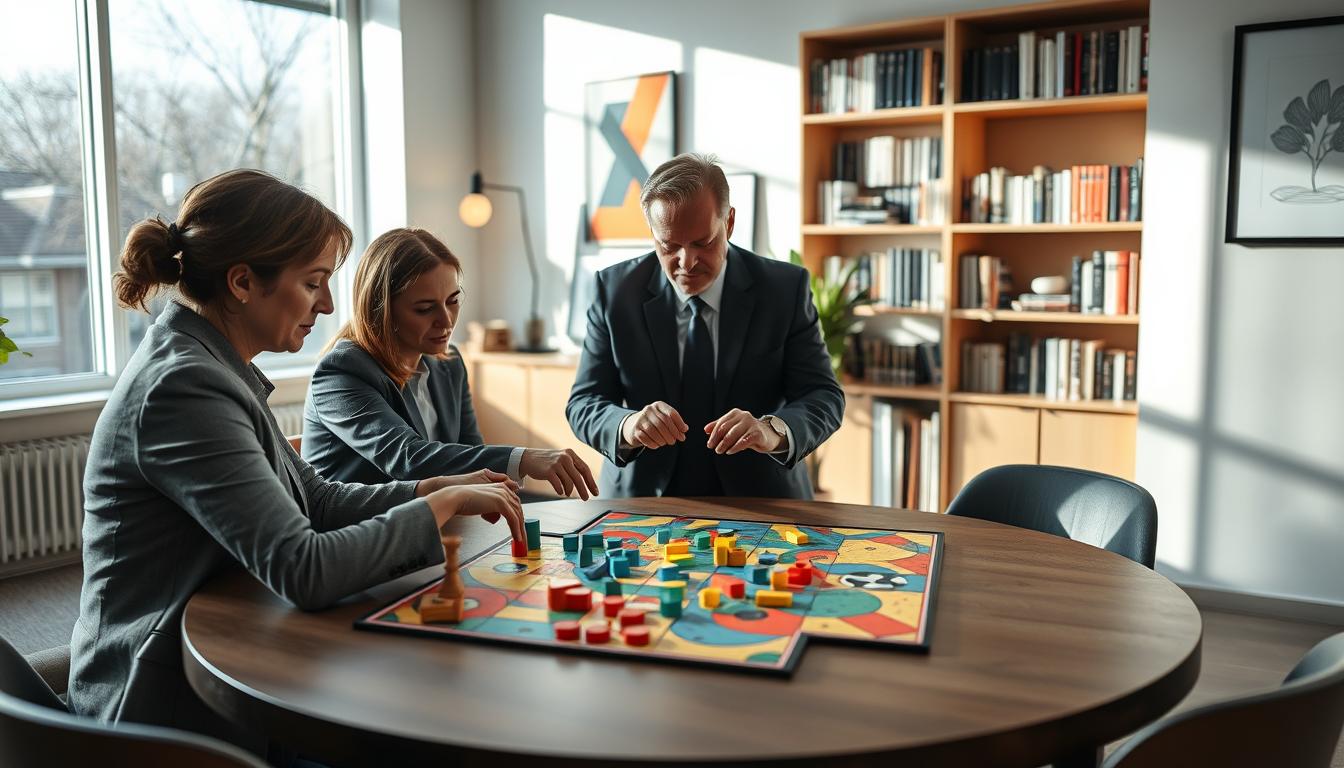Educational games that improve word retrieval and verbal agility in adults
Ever thought a simple game could boost your verbal skills? As we grow, speaking clearly is key, but many find it hard. Educational games for adults are a fun way to improve communication. They’re not just for fun; they help grow your brain.
These games can make a big difference in how well you speak. They help adults get better at using words and talking clearly. Let’s dive into how these games can help you communicate better.
Introduction to Educational Games for Adults
Educational games for adults are great tools for learning. They help improve language and communication skills. These games make learning fun and structured, unlike old methods.
Studies show that games can change how we learn. Adults get excited about learning new words and skills through games. This makes them want to keep learning.

Understanding Word Retrieval Difficulties
Many people face challenges when trying to find the right words. This is known as anomia. It makes conversations hard, leading to frustration and problems in talking to others. These issues can come from brain problems or getting older, making it hard to communicate every day.
Feeling embarrassed or worried is common when you can’t find the right words. It’s not just about finding words; it affects how you feel about yourself and can make you feel alone. It’s important to understand and help with these problems to improve talking skills.
Working on these challenges can lead to better verbal skills. Using games and activities that focus on words can help. By doing these activities every day, people can get better at talking and overcome language barriers.

The Importance of Verbal Fluency
Verbal fluency is key in how we talk and connect with others. It’s not just about making sense. It’s also about quick thinking, using the right words, and sharing our thoughts well. Getting better at verbal fluency can make our communication more effective in many areas of life.
When we talk to people, those who are good at verbal fluency have easier conversations. They make deeper connections and share ideas clearly. At work, being good at talking helps with presentations, negotiations, and getting along with colleagues. It also makes us feel more confident when we speak.
Studies show that being fluent in words can lead to better social lives and more job chances. People who talk well are seen as more skilled and can handle tough situations easily. Working on verbal fluency is a smart move for both personal and career growth.
Benefits of Playing Brain Games for Verbal Fluency Development
Playing brain games has many benefits, especially for improving verbal fluency. These games are fun and help boost language skills.
Enhancing Vocabulary
Brain games are great for learning new words. They offer a fun way to discover a wide range of vocabulary. This helps in both personal and professional communication.
Players often use new words in their daily talks. It makes their conversations more interesting and varied.
Boosting Word Recall
Playing these games also improves word recall. It trains the brain to quickly find the right words. This makes talking easier and more effective.
It helps in smooth conversations. Thoughts can flow better, making communication more effortless.
Improving Cognitive Skills
Brain games also enhance cognitive skills. They improve problem-solving and critical thinking. These skills are crucial for clear communication.
Players can express their thoughts more effectively. This leads to more meaningful conversations.
Popular Educational Games for Word Retrieval
Playing educational games for adults can really help with word retrieval. These games make learning fun and help improve language skills. They also let adults socialize and work together.
Naming games are a big hit. They challenge players to quickly think of words related to certain themes. These games make learning fun and help players understand language better. Word association games also boost verbal skills by encouraging quick thinking.
Playing with others makes the experience even better. It creates a friendly competition where everyone learns together. This atmosphere motivates players to do their best and get better at language.
Looking for language games to add to your routine? There are many options online and on mobile apps. Trying different games keeps practice exciting and relevant. With these games, adults can easily improve their word skills.
Types of Brain Games That Enhance Verbal Skills
Many brain games help improve verbal skills. These games are fun and make you think hard. They boost your language skills and keep your mind sharp.
Crossword puzzles, Scrabble, and memory games are great examples. Each one has its own way of helping you get better at speaking and thinking.
Crossword Puzzles
Crossword puzzles are great for learning new words and improving your brain. They make you remember words and their meanings. This helps you get better at solving problems and thinking clearly.
Doing these puzzles regularly makes your mind faster and better at remembering words. It’s a fun way to get smarter.
Scrabble and Other Word Games
Scrabble and other word games are loved by many. They make learning a language fun and competitive. You have to think smart and use your words wisely.
Playing these games not only helps you learn new words. It also makes you better at solving problems and thinking critically. Plus, it’s a great way to meet new people and have fun.
Memory Matching Games
Memory games are a fun way to improve your memory. They involve matching words or phrases. This helps strengthen your brain’s connections.
By playing these games, you get better at remembering things. This makes you a better communicator and expands your vocabulary.
Therapeutic Benefits of Naming Therapy Apps
Naming therapy apps are great for people who struggle to find the right words. Apps like Naming Therapy offer tools to improve language skills through fun activities. They mix speech therapy with games, making learning a joy.
These apps work well because they use pictures to help remember words. This helps users connect words with images, making it easier to talk. Some apps even add a competitive edge, which motivates users to keep practicing.
Using word retrieval tools makes learning fun and supportive. Users can see how they’re improving, which boosts their confidence. This way, naming therapy apps help people overcome word challenges and support their speech therapy journey.
Integrating Brain Games into Daily Routines
Adding brain games to your daily routine can boost your brain power. By setting aside time each day, you can get better at finding words and speaking quickly. This regular practice is key to improving your verbal skills.
Setting Time for Practice
Make playing brain games a daily habit. Try to spend at least 10 minutes a day on these activities. Doing this every day helps you see your verbal skills get stronger.
Variety of Games to Challenge Skills
Try different games to keep things interesting. You can play crossword puzzles, word searches, or memory games. This variety helps improve your verbal skills in many ways and keeps you engaged.
Engaging with Others: Collaborative Educational Games
Collaborative educational games are great for social engagement. Players work together to solve problems and reach goals. These games improve communication skills and help players share their ideas clearly.
By joining in collaborative learning, players boost their thinking skills and learn from others. This shared experience makes learning more fun. Players must think fast and adjust their communication, which helps them grow.
Games like team word challenges or brainstorming activities help players talk better. They learn to work together and use their vocabulary. This teamwork makes learning more fun and effective.
| Game Type | Benefits | Examples |
|---|---|---|
| Word Challenges | Enhances vocabulary through teamwork | Word Bingo, Word Jumble |
| Team-Based Strategy Games | Encourages verbal communication and problem-solving | Codenames, Pictionary |
| Interactive Storytelling | Fosters creativity and collaborative narrative building | RPGs, Story Cubes |
Using these games in groups helps players make friends and improve their speaking skills. They learn to work together and grow their language abilities. This shows how important it is to work with others in learning.
How Brain Games Foster Cognitive Development
Playing brain games can really help your brain grow. They’re fun and make your brain work better. This means you can remember things better and think faster.
Studies show that playing brain games often can make your brain stronger. This is good for your memory and how well you can solve problems.
Connection Between Brain Games and Memory
Brain games help your brain change and grow. They make your brain better at remembering things. This is because they help your brain remember and find information.
Playing games that make you remember words or solve puzzles is good for your brain. It helps your brain get better at storing and finding information.
Critical Thinking and Problem Solving
Brain games also make you better at thinking and solving problems. They make you think ahead and come up with good plans. This helps you in many areas of life.
By playing different games, you get better at solving problems. This makes your brain more flexible and ready for anything.
| Game Type | Impact on Memory Skills | Enhancement of Critical Thinking |
|---|---|---|
| Crossword Puzzles | Improves verbal memory and recall | Encourages lateral thinking |
| Scrabble | Enhances word memory and vocabulary | Fosters planning and strategy |
| Memory Matching Games | Boosts retention and recall speed | Develops pattern recognition |
Incorporating Technology: Apps for Word Retrieval
Technology has changed how we learn, especially with verbal skills. Word retrieval apps are key digital tools for improving vocabulary and language skills. They offer fun ways to practice, helping anyone boost their verbal agility.
Apps like Elevate and WordBrain make learning interactive. They use games to keep users engaged. Users get instant feedback, helping them see how they’re doing and guiding their learning.
These apps have many exercises and challenges to boost brain power. Using technology in learning makes it flexible and fits your pace. It’s a step towards combining old and new learning methods.
Exploring Resources for Effective Learning
Adults looking to improve their language skills have many resources at their disposal. These tools offer great support for learning and help with speaking and understanding words better.
Online platforms with interactive exercises are very helpful. They have quizzes, flashcards, and videos to improve your language skills. Sites like Duolingo and Babbel are easy to use and have clear learning paths.
Traditional websites like Quizlet also offer great help. You can make your own study sets to fit your needs. Using these resources every day can make learning a language more structured.
Books on language learning and cognitive science are also great resources. Reading different types of materials can help you remember new words and ideas better.
Conclusion
Engaging with educational games offers many benefits, especially for adults looking to improve their verbal fluency. These games are not just fun but also boost word retrieval skills. They sharpen communication skills, which are crucial in daily life.
By adding brain games to our daily routines, we can enjoy learning and improve our thinking. Word-focused activities, like crossword puzzles and team games, cater to all tastes. They make learning fun and help improve language skills.
Continuing to develop ourselves is key, and educational games are a great way to do so. They enhance vocabulary and overall brain function. This shows that investing time in these games pays off in many ways.
The path to better verbal skills is filled with fun challenges. It prepares us for success in our daily conversations. In a world that values good communication, playing educational games is a smart move.
FAQ
How do educational games enhance language skills in adults?
Games make learning fun and interactive. They help adults learn new words and phrases. This makes learning easier and more enjoyable.
What are some common challenges adults face with word retrieval?
Many adults have trouble finding the right words. This is called anomia. It can make talking hard and affect how they feel.
Why is verbal fluency important for adults?
Being able to talk well is key for work and personal life. It helps build better relationships and succeed in many areas.
What types of brain games are beneficial for developing verbal skills?
There are many games that help with words. Crosswords and Scrabble improve vocabulary. Memory games help remember words better.
How do naming therapy apps help with word retrieval challenges?
Naming apps, like Naming Therapy, use pictures and games to help find words. They make learning fun and supportive.
What strategies can be used to integrate brain games into daily routine?
Play games at set times every day. Try different games to keep learning fun and interesting.
Can playing games collaboratively enhance communication skills?
Yes, playing games with others helps talk better. It makes learning together fun and helps everyone practice speaking.
How do brain games contribute to cognitive development beyond language?
Games improve memory and thinking skills. They help solve problems and keep the mind sharp. This benefits more than just language skills.
What technological solutions are available for improving word retrieval?
Apps like Elevate offer personalized learning. They help improve finding words and make technology useful for language skills.
Are there additional resources for language learning beyond games?
Yes, there are many tools and websites for learning. They help with word skills and talking fluently, along with games.














